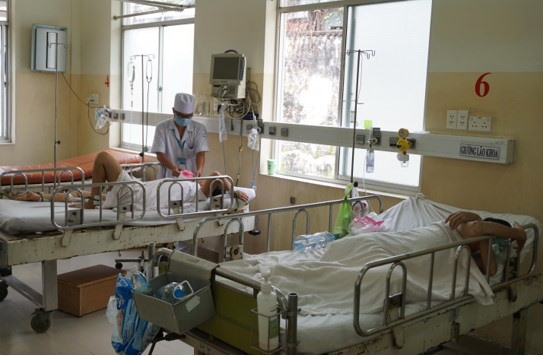 Society
Society

As the HIV response is being integrated into the general healthcare system, improving awareness of healthcare workers is important in addressing discrimination and stigma.
 |
| HIV patients receive treatment at Phạm Ngọc Thạch Hospital in HCM City. Photo Phương Vy |
HCM CITY — As the HIV response is being integrated into the general healthcare system, raising awareness of healthcare workers is important in addressing discrimination and stigma.
“Stigma and discrimination related to HIV remain among the biggest barriers to universal access to HIV health services, and this leads to a high number of AIDS-related deaths,” said Marie-Odile Emond, country director of UNAIDS (United Nations Programme on HIV/AIDS) Việt Nam.
Despite great efforts from the Government and affected communities over the years, discrimination still exists in schools, workplace, family, community and healthcare facilities, she said at a conference held yesterday in HCM City.
This has hindered Việt Nam’s progress towards achieving testing and treatment 90-90-90 targets (90 per cent of all people living with HIV will know their HIV status; 90 per cent of all people with diagnosed HIV infection will receive sustained antiretroviral therapy; and 90 per cent of all people receiving antiretroviral therapy will have viral suppression) and the goal of ending AIDS by 2030, she said.
People living with HIV in fear or denial are less likely to get tested, disclose their HIV status to intimate partners, families and caregivers, and often will seek treatment late and at times even too late.
People at higher risks of HIV infection, including users of injected drug, sex workers and men who have sex with men, face even double stigma and discrimination in accessing HIV and other health services.
Việt Nam has a clear supportive legal framework that addresses HIV stigma and discrimination, including the Law on HIV/AIDS Prevention and Control and many sub-law instruments.
“The challenge often lies in inconsistent enforcement of these across all sectors and at all levels, and as the law cannot cover all situations,” she added.
In 2015, UNAIDS launched a fast-track approach, focusing on innovative interventions to reduce discrimination in healthcare settings in large cities, including HCM City.
The pilot project was implemented between September 2016 and December 2017 in three health facilities in HCM City: Phạm Ngọc Thạch Hospital in HCM City, District 6 Hospital, and District 4 Preventive Medical Centre.
The project includes two major components: assessment of sigma and discrimination in healthcare settings and interventions to reduce HIV related sigma and discrimination.
After more than a year of implementation, the results and useful lessons learned from the project will inform the national policy to reduce discrimination in healthcare settings and expand this effort in other high-burden provinces, with support from development partners.
Findings from the project show that it was necessary to measure stigma and discrimination in healthcare settings to develop evidence-based interventions that would improve the quality of health care services.
A participatory training approach with healthcare workers to share views and agree on action, as well as dialogue between patients and health care providers to better understand stigma and discrimination issues and health facilities’ procedures, are critical factors to reduce HIV-related stigma and discrimination.
Discrimination comes from limited awareness and knowledge of HIV, HIV transmission, and lack of universal precautions among healthcare workers, said Lê Tiến Dũng, deputy director of Phạm Ngọc Thạch Hospital.
The programme’s participatory training with healthcare workers proved useful and led to initial changes, according to Dũng. — VNS




